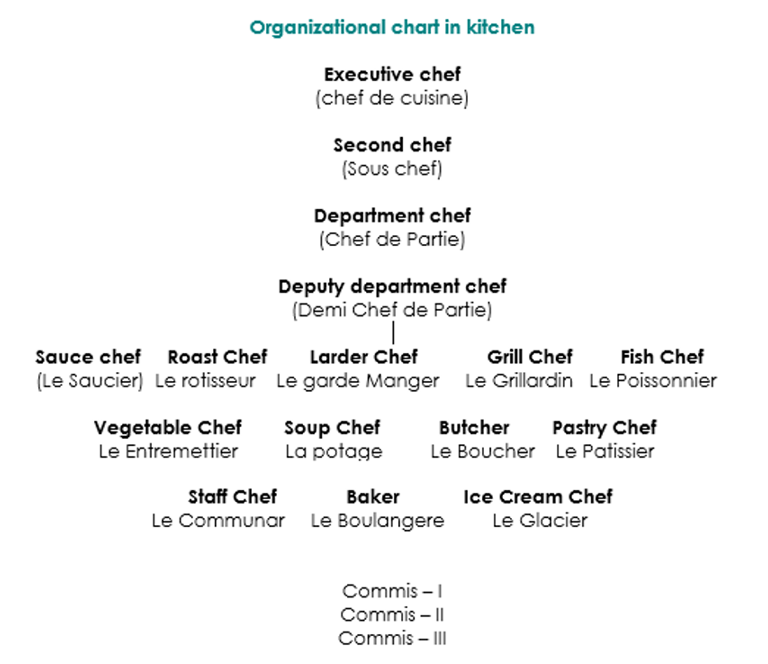
Hospitality Managememt
FOOD PRODUCTION DEPARTMENTS OF HOTELS


Food Production Organisational and Hierarchy
Hotel Kitchen departmentalization
An organizational chart for a hotel kitchen department can vary depending on the size of the hotel, the number of restaurants, and the hotel's overall structure. However, here is an example of a typical organizational chart for a hotel kitchen department:
1. Executive Chef:
The executive chef is the head of the kitchen and responsible for overseeing all aspects of kitchen operations, including menu planning, recipe development, staff management, and budgeting.
2. Sous Chef:
The sous chef is the second in command in the kitchen and is responsible for assisting the executive chef with all aspects of kitchen operations, including menu planning, recipe development, staff management, and budgeting.
3. Chef de Partie:
The Chef de Partie is responsible for overseeing all aspects of section food production, including menu planning, recipe development, staff management, and budgeting.
4. Line Cooks:
The line cooks are responsible for preparing and cooking food to order, following recipes and ensuring that dishes are presented in a timely and aesthetically pleasing manner.
5. Dishwashers:
The dishwashers are responsible for maintaining cleanliness in the kitchen and washing dishes, utensils, and other kitchen equipment.
6. Stewarding Manager:
The stewarding manager is responsible for overseeing the dishwashing and cleaning areas of the kitchen and ensuring that all equipment is properly maintained.
7. Kitchen Assistants:
Kitchen assistants are responsible for performing a range of tasks in the kitchen, including food preparation, cleaning, and other tasks as needed.
In addition to the kitchen department roles mentioned earlier, here are a few more departments that you may find in a 5-star hotel kitchen:
1. Banquet Department:
This department is responsible for overseeing all aspects of banquet and catering events, including menu planning, food preparation, and presentation. The department is often led by a Banquet Chef who works closely with the Executive Chef to ensure that all events are executed flawlessly.
2. Garde Manger Department:
The Garde Manger Department is responsible for the preparation of cold dishes such as salads, charcuterie, and hors d'oeuvres. The department is often led by a Garde Manger Chef who oversees the preparation and presentation of these dishes.
3. Butchery Department:
The Butchery Department is responsible for the preparation of meats and poultry. The department is often led by a Butcher who is responsible for overseeing the cutting, trimming, and portioning of meat.
4. Pastry Department:
The Pastry Department is responsible for the preparation of all desserts, bread, and other baked goods. The department is often led by a Pastry Chef who oversees the preparation and presentation of all pastries.
5. Restaurant Department:
The Restaurant Department is responsible for overseeing the operation of all restaurants within the hotel. The department is often led by a Restaurant Manager who is responsible for ensuring that all restaurants are operating efficiently and providing guests with an exceptional dining experience. The Restaurant Department may also include a sommelier who is responsible for selecting and recommending wine pairings for guests.
Departments that find in star Hotel Kitchen:
1. Purchasing Department:
The Purchasing Department is responsible for sourcing and purchasing all ingredients and supplies required for the kitchen. This department is often led by a Purchasing Manager who works closely with the Executive Chef to ensure that all ingredients and supplies are of the highest quality.
2. Beverage Department:
The Beverage Department is responsible for overseeing the preparation and service of all beverages within the hotel, including alcoholic and non-alcoholic beverages. This department is often led by a Beverage Manager who works closely with the Restaurant Manager and the Executive Chef to ensure that all beverages are perfectly paired with the food.
3. Nutrition Department:
The Nutrition Department is responsible for ensuring that all meals prepared in the kitchen meet the nutritional requirements of guests. This department is often led by a Nutritionist who works closely with the Executive Chef to develop menus that are both nutritious and delicious.
4. Catering Department:
The Catering Department is responsible for overseeing all aspects of off-site catering events. This department is often led by a Catering Manager who works closely with the Executive Chef to ensure that all catering events are executed flawlessly.
5. Kitchen Maintenance Department:
The Kitchen Maintenance Department is responsible for the maintenance and repair of all kitchen equipment. This department is often led by a Maintenance Manager who works closely with the Executive Chef to ensure that all equipment is properly maintained and repaired in a timely manner.
www.ehospitalitystudies.com


FOOD PRODUCTION DEPARTMENTS OF HOTELS



Solve your problems with each others help!
HOSPITALITY
Our mission is to help you grow hospitality faster. Each one of us can contribute to making it better.
It's going to work like this
Send your newsletters about hospitality
You can take advantage of this site by sending mail about happenings in hospitality, job opening, articles, news and so much so readers can get benefited from it. As the aim is to grow hospitality together.
Display your add here
You can send add creative of your hospitality-related product, material, school, college, university and so much, so reader can get to you.



